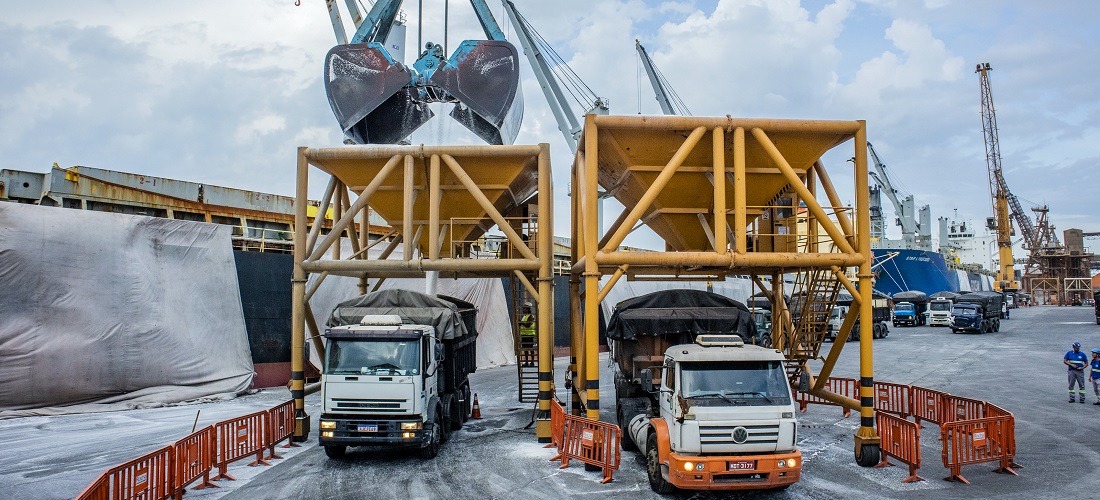
Rising imports and sluggish demand keep fertilizers in ports and ship holds
May, 30, 2022 Posted by Gabriel MalheirosWeek 202222
On Friday, May 27th, the Port of Paranaguá, the main gateway for fertilizers in Brazil, announced the docking of 7 ships loaded with the product, with another 16 already waiting to unload and 18 others reported to arrive at the port in the next 30 days.
According to Paraná Portos, the company that manages the terminal, the port is seeing an unusual amount of fertilizers.
According to data from Camex, in the first four months of this year, the terminal handled 3.6 million tonnes of fertilizers, an increase of 14% compared to the same period in 2021.
As a result, the port’s entire storage capacity (3.5 million tonnes) is already in use, making unloading operations more difficult.
See below the track record of Brazilian fertilizer imports from January 2021 to March 2022. The data are from Datamar’s service DataLiner.
Imports of Fertilizers from Brazil | January 2021 – March 2022 | WTMT
Source: DataLiner (click here to request a demo)
The situation in Paranaguá stems from two different strategies.
On one end, buyers decided to anticipate their purchases of fertilizers in fear of eventual shortages, especially after the sanctions against Russia and Belarus came into force due to the war in Ukraine, not taking into account the non-availability of sufficient storage in the country.
Brazil imports about 85% of the fertilizers it consumes.
On the other hand, rural producers are postponing purchases of inputs, expecting better prices, especially in the second half of the year.
According to Luiz Teixeira da Silva, operations director at Portos do Paraná, the ships that dock at the Port of Paranaguá to unload fertilizers do so directly in the rear warehouses outside the organized port area.
“These warehouses are owned and operated by the private sector, and they rent space to importers who store their goods there. The rear warehouses have a total capacity of around 3.5 million tonnes. Normally, goods are turned inwards to keep the system from becoming overburdened. Fertilizers are currently unavailable in Paranaguá. As a result of the importer’s anticipation of purchases, we have a large volume arriving and a much smaller volume leaving due to the delay in selling to the rural producer,” he explains.
Silva believes that the market is adapting to new realities, such as a pandemic and war, and that it will take a while for trade to start running normally.
“We are talking about a combination of factors: anticipated purchases, freight price increases, more expensive products, etc. These are some variables that the market will have to cope with and try to regulate,” he says.
Fertilizer prices
The price of the main fertilizers in the market has increased by more than 350%, from an average of US$ 350 per tonne in the previous crop cycle to US$ 1,300 per tonne in this year’s crop, a percentage increase that, according to the Mato Grosso Association of Soybean and Corn Producers (Aprosoja-MT), could result in global food shortages.
According to Fernando Cadore, president of the entity, the impact of increasing prices will be felt not only by rural producers but also by final consumers, who will have less food available on the shelves.
“This week, we asked the Parliamentary Agricultural Front to demand the Administrative Council for Economic Defense (Cade) to seek explanations from companies about the price readjustment considered ‘abusive and inexplicable’ by producers. This action seems like a cartel on the make, that is, a readjusment to generate profit for the few industries that operate in the country,” says Cadore.
Source: Canal Rural
To read the full original article, please go to:
-
Trade Regulations
Oct, 21, 2022
0
Study finds 367 opportunities to boost Brazil-India trade
-
Ores
Nov, 10, 2023
0
Mining Org Claims Gold Export Bureaucracy in Brazil Fuels Illegal Market
-
Ports and Terminals
Jul, 05, 2022
0
Drug traffickers use Brazil northeast ports as hubs to distribute cocaine
-
Ports and Terminals
Oct, 20, 2021
0
China’s strategic network of global ports



